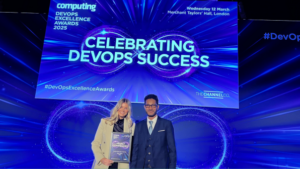
Life after the armed forces: A future in cloud engineering at Zaizi
You know the way kids dream of what they want to be when they grow up? Being a Royal Marine was my dream job. Armed service runs in the family. My uncle and my cousin were both marines and my grandfathers were in the army and the navy.
After school I applied, and I went to college, just as a back-up. You need a back-up, in case you get injured or can’t hack it. But I went through the fitness tests and interviews, and got accepted before leaving college.
I completed 32 weeks of basic training down at the commando training centre in Devon. Next, I was stationed at a base in Scotland, then to commando units in Taunton and Plymouth. During these times, I deployed on operational tours abroad. I had a stint as a radio operator – what we call signallers – but I spent most of my time as an anti-tank specialist. I also undertook humanitarian aid work in the aftermath of hurricanes and things like that.
Looking for a fresh start
It was a rollercoaster. I had a great time, got to travel the world. But there were also massive low points, and times away were often hard. I served for about 11 years in all, and by then, I was ready to leave.
Being in the Royal Marines isn’t really a sustainable lifestyle – I’d be away for four or five months a year, and I had a wife and kids at home. So I made the choice to leave without any real idea of what I wanted to do. I just knew I needed to change my life and do something else that could benefit my family.
You have to give 12 months notice, which is good in a way, because it gives people the platform to build the foundations for their new career.
I’d been looking to get into cybersecurity, as there’s a lot of military-focused avenues that help you get from A to B. You can do certifications and attend academies, and because you’re ex-forces, you can get funding to get you through it. I handed in my notice in June 2019. Then Covid happened. In the space of two weeks, all my work experience plans were gone. Overnight I was just back at square one.
Transitioning to tech
I knew I wanted to work in tech, so my first thought was, I need to focus on tech-based roles. My first job was as a first-line engineer on a service desk. I didn’t enjoy that side of things. Really, I wanted to be more hands-on on the technical side. I did that for a few months. Then one day Zaizi popped up in my feed. I was immediately interested.
One thing I liked was the idea of it being an IT consultancy, a company that revolves around tech. I interviewed for a role in the OC team, but the conversation I had in the interview was really encouraging. The message was, we’ve got different avenues here. If you want to develop your skills as a software developer, or move to cloud engineering at Zaizi, we’ll help you pursue the career that you want to do.
I got the job and I worked in support for about a year. During that time I started working with the SRE team, and I got really interested in the idea of cloud engineering at Zaizi. Even though it wasn’t cybersecurity, there were aspects to it – like working with firewalls, or hardening platforms – where there was this clear crossover.
READ: From graduate to cloud engineering – a career in cybersecurity at Zaizi
Learning on the job
Then Zaizi gave me the opportunity to move into the role of an associate cloud engineer. Rather than throwing me in at the deep end, sink-or-swim, the discussion was: why don’t you spend half your time in the OC team, and then half your time on some internal projects, getting to grips with things? I spent some time learning TerraForm and Docker, and then over time I started picking up work with clients, working to sustain their services.
I don’t think there are any practical skills that I learned in the Marines that feed into what I’m doing now. What I learned in the military is more intangible than that. It builds character – a work ethic and a drive to succeed. It means you can go into a meeting or talk to people and present yourself in a confident way.
Earlier this year I passed my AWS Solution Architect associate exam. But I don’t want to go too far down the certification route right now. My ambition right now is to get better at Python, improve my engineering skills and then next year I might do another qualification.
I’m excited about the future, and I’m eternally grateful to Zaizi for taking me on. Because although I’ve put the work in and proven myself, it still needs that person who looks at you and is like: yeah, we’ll give him a shot. It’s completely changed my life, genuinely. The pay is good, the job is great – I couldn’t be happier.
If you’re looking for your next growth opportunity or would like to change careers – please get in touch – we would love to hear from you!
-

Zaizi talent shines at Computing DevOps Excellence Awards 2025
-

Does the state need to be more like a start up?
-

My first Regional Scrum Gathering in Stockholm – key takeaways
-

How product management improves public sector digital services
-

How a business analyst brings value to agile delivery in the public sector
-

Zaizi named in several Most Loved Workplaces® lists for 2024
